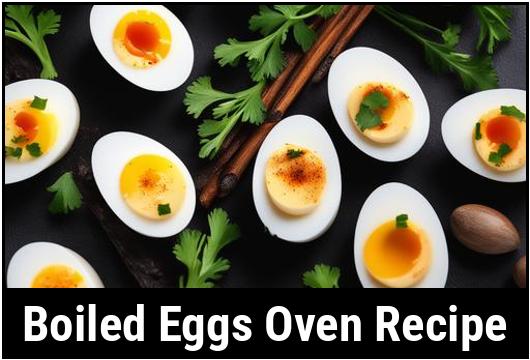
Boiled Eggs Oven Recipe: Unlocking The Eggsquisite Potential
Are you tired of traditional stovetop boiled eggs that sometimes come out undercooked or overcooked? Look no further! In this comprehensive guide, we will delve into the magnificent world of boiled eggs prepared in the oven, ensuring a foolproof method to achieve perfectly cooked eggs every time. Get ready to elevate your breakfast or any meal of the day to new heights of egg-cellent deliciousness!
Understanding the Food Science Behind Boiled Eggs
To begin our journey toward egg-cellence, let’s delve into the food science behind boiled eggs. Eggs, a versatile and nutritious ingredient, are an excellent source of protein and essential vitamins. When exposed to heat, the proteins in eggs coagulate, transforming the liquid yolk and egg white into a solid form.
When boiling eggs conventionally in water, the high temperature cooks the eggs from the outside in. However, using an oven allows for a more controlled and consistent heat distribution, resulting in tender, perfectly cooked eggs with an evenly creamy-yolked center.
Selecting the Finest Eggs
To achieve the best results, it is crucial to start with high-quality eggs. When selecting eggs, consider freshness, as older ones tend to have a higher pH level, making them easier to peel. Additionally, choose eggs that have intact shells and appear clean without any cracks or other damage.
Cleaning and Preparing the Eggs
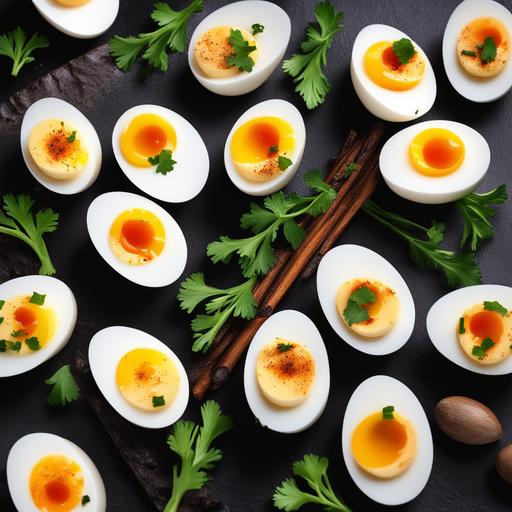
Before we delve into the actual oven cooking process, it is important to clean and prepare the eggs. Begin by gently rinsing each egg under cold running water to remove any dirt or potential contaminants. Once cleaned, carefully pat them dry with a clean kitchen towel or paper towels.
Tips for Oven Cooking Success
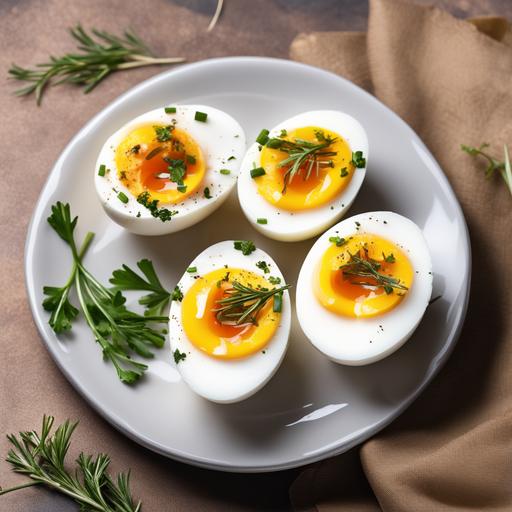
Now that our eggs are pristine and ready, let’s explore some essential tips to ensure a successful oven-cooked boiled egg experience:
-
Tray Selection: Use a baking tray or a muffin tin to keep the eggs stable during the cooking process, preventing them from rolling around.
-
Egg Positioning: Position the eggs horizontally in the tray or muffin tin, ensuring they are not touching. This allows for even heat distribution and consistent results.
-
Preheating: Preheat your oven to 325°F (163°C) to provide a gentle, even cooking environment for the eggs.
-
Timing: The cooking time varies depending on the desired doneness, the size of the eggs, and the peculiarities of your oven. Experiment to find your ideal cooking time by starting with the suggested times mentioned later in this article.
-
Egg Placement: Place the tray on the middle rack of the oven to ensure uniform heating from all sides.
-
Egg Rotation: To achieve consistent results, gently rotate the eggs halfway through the cooking process. This helps to avoid potential hotspots within the oven and promotes even heat distribution.
-
Cooling: Once cooked, transfer the eggs to an ice bath immediately. This halts the cooking process, preventing overcooking and yielding a perfectly tender texture.
-
Peeling Technique: For easier peeling, gently tap the cooked egg on a hard surface, then roll it between your palm and the surface to loosen the shell. Submerging the egg in water during peeling can also make the process smoother.
Now that we have established the necessary groundwork for oven-cooked boiled eggs, let’s explore some exciting variations and doneness checks to cater to individual preferences.
Exploring Variations and Doneness Checks
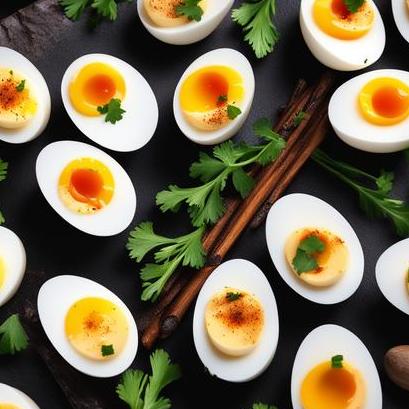
Soft-Boiled Eggs
If you enjoy a delectably runny yolk, the soft-boiled variation is perfect for you. To achieve this consistency, aim for a cooking time of around 6-7 minutes for medium-sized eggs in a preheated oven. Adjust the timing based on your desired level of runniness.
Medium-Boiled Eggs
For those who prefer a slightly firmer yolk, the medium-boiled variation is an excellent choice. To achieve a creamy yet slightly firm yolk, cook your medium-sized eggs for approximately 8-9 minutes in a preheated oven.
Hard-Boiled Eggs
If a fully set, firm yolk is your ultimate goal, the hard-boiled variation is what you’re looking for. Successfully achieving a hard-boiled egg requires a cooking time of approximately 12-15 minutes in a preheated oven. However, depending on the size of your eggs and personal preferences, you may need to adjust the cooking time accordingly.
Doneness Checks
Determining the desired level of doneness is crucial. To check the doneness of your eggs, gently spin one on a countertop. A soft-boiled egg will wobble and have a slightly unsteady spin, while a hard-boiled egg will spin smoothly without any wobbling.
If you prefer a more precise method, use an instant-read thermometer. For soft-boiled eggs, aim for an internal temperature of around 145°F (63°C). Medium-boiled should read between 150-155°F (65-68°C), and hard-boiled should reach an internal temperature ranging from 160-165°F (71-74°C).
Recipe: Oven-cooked Perfect Boiled Eggs
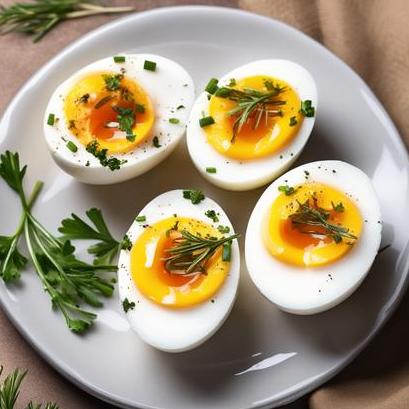
Ready to embark on your oven-cooked egg-venture? Let’s dive into the step-by-step recipe to achieve the ultimate perfection.
Ingredients:
-
Fresh eggs (preferably medium-sized)
-
Salt (optional, for seasoning)
Tools:
-
Baking tray or muffin tin
-
Oven mitts
-
Timer
-
Instant-read thermometer (optional)
-
Ice bath (large bowl with ice and water)
Instructions:
-
Preheat your oven to 325°F (163°C).
-
Place the eggs horizontally in a baking tray or muffin tin, ensuring they don’t touch.
-
Carefully place the tray or tin in the preheated oven on the middle rack.
-
Cook the eggs as per your desired doneness:
-
Soft-boiled: 6-7 minutes
-
Medium-boiled: 8-9 minutes
-
Hard-boiled: 12-15 minutes
-
After half of the cooking time has passed, gently rotate the eggs to ensure even heat distribution.
-
While the eggs are cooking, prepare an ice bath by filling a large bowl with ice and water.
-
Once the eggs have reached the desired doneness, take the tray or tin out of the oven, using oven mitts to protect your hands.
-
Transfer the eggs immediately into the ice bath to stop the cooking process and cool them.
-
Allow the eggs to cool in the ice bath for at least 5 minutes.
-
Once cooled, gently tap each egg on a hard surface, then roll it to loosen the shell.
-
Submerge the egg in water and peel the shell, removing any remaining pieces.
-
Rinse each peeled egg under running water to remove potential shell remnants.
-
Optionally, season the eggs with a pinch of salt or any desired seasonings.
-
Serve and enjoy your perfect oven-cooked boiled eggs.
Overcooking and Undercooking Eggs: Troubleshooting
Perfecting the ideal boiled eggs in the oven can sometimes present a challenge. In the event of overcooked or undercooked eggs, fear not! Here are a few troubleshooting tips to handle these scenarios:
Tips for Overcooked Eggs:
-
Reduce the cooking time: Since oven temperatures can vary, reduce the cooking time by 1-2 minutes and reassess the doneness to achieve your desired result.
-
Experiment with lower temperature: Try lowering the oven temperature by 10-15 degrees Fahrenheit and adjust the cooking time accordingly.
Tips for Undercooked Eggs:
-
Increase the cooking time: Extend the cooking time by 1-2 minutes, keeping a watchful eye on the eggs to maintain the desired level of doneness.
-
Experiment with higher temperature: Increase the oven temperature by 10-15 degrees Fahrenheit and adjust the cooking time accordingly while monitoring the eggs closely.
By applying these tips, you can fine-tune your oven-cooked boiled eggs and overcome any hurdles to achieve the perfect results.
Embrace the Versatility
Now that you have mastered the art of oven-cooked boiled eggs, it’s time to get creative and explore the vast world of flavors and pairings. Here are some ideas to enhance your breakfast or any meal:
-
Avocado and tomato slices with a hint of chili flakes on toast, topped with a soft-boiled oven-cooked egg.
-
A Cobb salad with oven-cooked medium-boiled eggs as a protein-rich addition.
-
Preparing a tasty egg salad sandwich with diced oven-cooked hard-boiled eggs mixed with mayonnaise, mustard, and your favorite seasonings.
-
Creating a delicious bowl of ramen or pho by adding halved, medium-boiled oven-cooked eggs as a garnish.
Remember, embracing the versatility of oven-cooked boiled eggs allows you to explore your taste preferences and unlock endless culinary possibilities.
In Conclusion
Congratulations! You have now embarked on an egg-citing culinary journey that will transform the way you prepare and enjoy boiled eggs. By utilizing the oven cooking method and following the tips, variations, and troubleshooting recommendations provided in this guide, you are now equipped to achieve consistently perfect eggs. Remember to experiment, have fun, and don’t hesitate to push the boundaries of flavor combinations.
So, gather your tray, preheat that oven, and venture into the realm of oven-cooked boiled eggs. Your taste buds will thank you for the gastronomic delight that awaits!
Sources
FAQS On Boiled Eggs Oven Recipe
What Are The Benefits Of Using An Oven To Boil Eggs?
Boiling eggs in the oven is a convenient and efficient way to cook them. It allows for multiple eggs to be cooked at once and requires less supervision compared to boiling them on the stovetop. It also results in evenly cooked eggs and prevents cracking, making it a great option for meal prepping or hosting a large group.
How Do You Ensure The Eggs Are Fully Cooked In The Oven?
To ensure the eggs are fully cooked, it is important to set the oven temperature to 325°F and bake for 30 minutes. This will ensure the eggs have reached a safe internal temperature of 160°F, eliminating any risks of salmonella.
Can I Use Any Type Of Eggs For This Method?
Yes, any type of eggs (chicken, duck, quail, etc.) can be boiled in the oven. However, keep in mind that different types of eggs may require different cooking times. For example, quail eggs may take less time to cook compared to chicken eggs.
Do I Need To Place The Eggs Directly On The Oven Rack Or Use A Pan?
It is recommended to place the eggs on a muffin tin or a baking dish to prevent them from rolling around in the oven. This will also make them easier to remove once they are cooked.
How Can I Tell If The Eggs Are Fully Cooked In The Oven?
To test if the eggs are fully cooked, remove one from the oven and carefully peel it. If the yolk is firm and the white is set, then the eggs are done. If not, place them back in the oven for a few more minutes until fully cooked.


